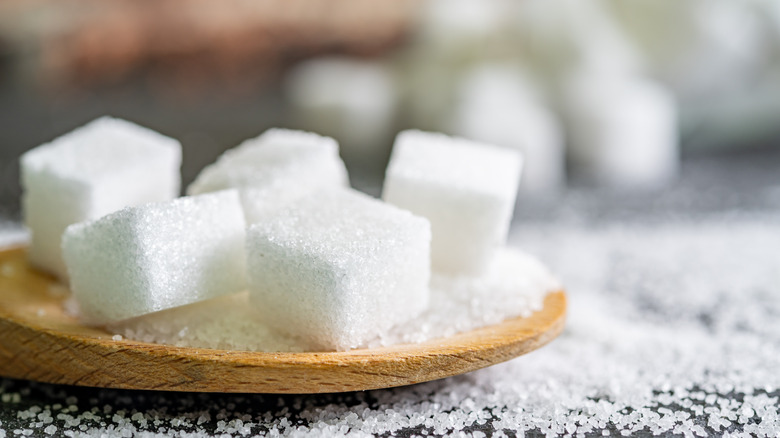Here's How Much Sugar Is Really In Your Glass Of Milk
The old ad slogan notes that milk does a body good, and the health benefits of the drink are hard to overlook. Milk is rich in calcium and can help to strengthen your bones and teeth, and also has potassium, which can contribute to healthy blood pressure, per WebMD. It's also a good source of protein and vitamin D.
However, according to the Physicians Committee for Responsible Medicine, there can be some drawbacks to drinking milk. They note that milk and other dairy products such as cheese are among the main sources of saturated fat in the average diet. This regular intake of saturated fat can be a contributing factor to heart disease later in life. In addition, the high fat content and hormones present in milk may play a role in the development of breast cancer and prostate cancer. Of perhaps more immediate concern is the impact milk may have on your appearance. According to a 2016 study published in the Journal of American Dermatology, teenagers who drank low-fat or skim milk had a greater risk of developing acne. In addition to these factors, milk also contains sugar, which some people try to avoid. But do they really have anything to worry about?
Sugar naturally occurs in milk
The average 8-ounce glass of milk contains approximately 12 grams of natural sugar . This is pretty much the same amount of sugar that you would find in an orange. The key word here is "natural," as opposed to added sugars that you might find in other sugary drinks. Milk's sugar comes from lactose, which helps with digestion and can boost your immune system, according to Medical News Today. The lactose that isn't digested by your body can actually be good for your gut, feeding the healthy bacteria and aiding in the absorption of calcium and magnesium, per Healthline.
The sugar that is naturally occurring in milk is also great for giving your body the energy it needs, which registered dietitian Briana Butler notes for Gonna Need Milk. While drinks with added sugar will raise your energy level only to lower it just as quickly in the infamous "sugar crash," milk also contains 8 grams of protein, which will keep your energy level up and your body moving. The sugars in milk are also broken down into glycogen, which can fuel your muscles and keep you active for longer.
Be wary of added sugars
While an ordinary glass of milk contains 12 grams of sugar, sweetened variations, such as chocolate milk, can have has much as 24 total grams, with 12 additional grams of added sugar. Some of the added sugar in chocolate milk comes from high fructose corn syrup, which can contribute to weight gain and some health conditions such as diabetes, explains Healthline. Additionally, one glass of chocolate milk contains about 3-4 teaspoons of added sugar, which is nearly a third of what the average man should consume daily and almost half of the recommended dose for women and children. All that said, chocolate milk is still milk, and, like its less-sweet counterpart, is a good source of calcium, potassium, vitamin D, and magnesium.
In general, the sugar that is naturally present in milk is not cause for concern, especially when weighed against the health benefits of drinking milk. It's important to be on the lookout for added sugars in any milks that you're drinking, so always check the labels to make sure that the sugar content isn't higher than you want it to be. In addition, if you have a condition that requires you to monitor your sugar intake, such as type 1 diabetes, you should be careful with how much milk you consume.



